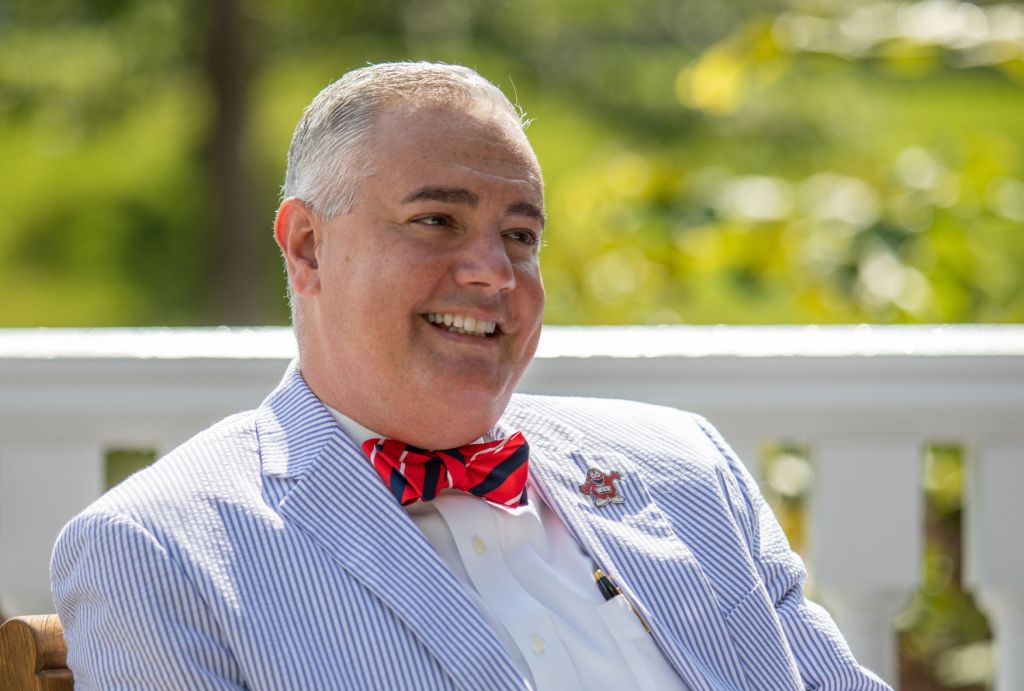Caboni announces new vaccination incentives, outlines quarantine rules
Published 12:15 am Monday, August 23, 2021

- Western Kentucky University President Timothy Caboni discusses the start of a new semester, enrollment, actions the campus is taking towards COVID-19 and vaccinations, reparations for Jonesville and other topics on the balcony of Craig Administration Center on Friday, Aug. 20, 2021. (Grace Ramey/photo@bgdailynews.com)
Calling widespread vaccination the only real solution out of the coronavirus pandemic, Western Kentucky University President Timothy Caboni said the university will launch a new incentive program for faculty, students and staff, complete with a lottery and a variety of enticing prizes.
Speaking during a wide-ranging interview with the Daily News on Friday, Caboni said the effort will target those who still have not gotten their coronavirus vaccine.
For students who vaccinate, WKU is giving away five scholarships for full, in-state tuition, along with drawings for iPads, dining dollars, parking passes and book scholarships. On the faculty and staff side, the university is offering $1,000 awards to 25 individuals.
“We’re really trying to create incentives for our community to be vaccinated,” Caboni said.
Those who have received at least one dose of the coronavirus vaccine will be eligible for the incentive program.
Like all public colleges across the state, WKU will require indoor universal masking regardless of an individual’s vaccination status. Explaining that recent change, Caboni told the Daily News indoor masking “helps create a comfort level among the community that we’re taking care of.”
He also framed it as the university’s best hope for remaining in-person amid the fast-spreading Delta variant.
“I think it’s crucially important, particularly for our most at-risk students that we’re back and that we’re back in person. So we’re excited about that,” Caboni said.
Asked if WKU will eventually lift its indoor mask mandate if it reaches a high enough vaccination rate, Caboni said the rate of coronavirus spread throughout Warren County is more likely to influence that.
When asked for a general estimate of how many students, faculty and staff have received the vaccine, Caboni said WKU will have a “better sense of that” once its vaccine incentive program is rolled out.
The Daily News also asked if students who remain unvaccinated will be required to get coronavirus tests multiple times throughout the pandemic – as the University of Louisville is doing. Caboni stopped short of stating that will be the case at WKU.
“We are going to be as aggressive, if not more so than last year with that contact tracing and quarantining,” Caboni said.
“Now, for those on campus, our quarantine is going to be a little bit different this year. If you were in close contact – but you’re vaccinated – you don’t have to quarantine. … If you are a student and if you live within three hours of campus and you test positive, we’re going to ask you to quarantine at home,” Caboni said. “So again, get your vaccine, wear a mask and we’re going to make it through this together.”
That said, WKU does have some limited space on campus for students who cannot return home. At this time, Caboni said the university only has enough space on campus for 33 individuals to quarantine, but “we also have the ability to expand that space as we need it.”
As of Friday, there were 38 individuals who tested positive for COVID-19, Caboni told the Daily News. Of those, nine were faculty and staff and 22 were students. Three students were quarantined on campus as of Friday.
“We believe that if we wear masks and we follow the CDC guidelines, we’re going to be in good shape as a community,” Caboni said.
Still, there are challenges ahead for WKU, with much of its success hinging on the kind of experience it delivers to students this fall.
“In terms of headcount and enrollment, we won’t know those numbers until we’re deeper into the semester, but it has been an exceedingly challenging year to recruit students to WKU because we’ve been unable to get into the schools,” Caboni said.
“What’s unfortunate is the students who most needed to be in person and weren’t are the ones that we’re missing out on. So we know our numbers, this number of entering freshmen this fall from first-generation students and low-income students will be off significantly. And the reason is because they have not had an adviser helping them see college in their future,” Caboni said, adding that high schools have done everything they can just to get students across the graduation line, let alone thinking about college, amid the pandemic.
“We’re going to continue to work during the course of the fall and the spring to help create opportunities for those who did not make the decision to come to college,” Caboni said, adding that could mean even anything from a certificate to a four-year degree.
WKU also has work to do in terms of faculty and staff compensation, and to that end, the university will roll out a 2% salary pool this academic year. When it comes to exactly how that pot of money will be spent and who specifically will see raises, Caboni said that’s still being determined by the university’s college deans.
Caboni has said WKU needs to deal with “compression” in employee compensation. It’s a bit of human resources jargon that generally means that more skilled and experienced employees at WKU haven’t seen their pay keep up with their counterparts at peer institutions.
“We’ve managed to have a 6% total increase in our salary pool during the past four years,” Caboni said, adding that the university doesn’t want to stop at 2% this academic year. Pulling that off depends on a combination of retaining students and the tuition dollars attached to them along with additional state higher education funding. “We need to continue that work in the coming years.”
– Follow education reporter Aaron Mudd on Twitter @NewsByAaron or visit bgdailynews.com.



